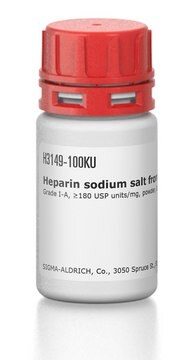15-105
mTOR phosphorylation Pathway Explorer Antibody MiniPack
This Antibody pack of Anti-mTOR antibodies contains Anti-phospho-mTOR Antibody(Ser2481), Anti-phospho-mTOR Antibody (Thr2446), Anti-phospho-mTOR (Ser2448).
別名:
FKBP12-rapamycin complex-associated protein 1, FKBP-rapamycin associated protein, Mammalian target of rapamycin, Rapamycin target protein, rapamycin associated protein FRAP2
ログイン組織・契約価格を表示する
すべての画像(6)
About This Item
UNSPSCコード:
12161503
eCl@ss:
32161000
NACRES:
NA.77
おすすめの製品
由来生物
rabbit
品質水準
抗体製品の状態
affinity isolated antibody
精製方法
affinity chromatography
メーカー/製品名
Upstate®
テクニック
activity assay: suitable
NCBIアクセッション番号
UniProtアクセッション番号
輸送温度
dry ice
遺伝子情報
human ... MTOR(2475)
詳細
Pathway Explorer Antibody MiniPack:
Each Pathway Explorer Antibody Minipack contains three related antibodies as part of a signaling cascade or a combination of total and phosphorylated forms of key signaling targets. Each of the three antibodies are 30% the original pack size. Full size versions of each of the Pathway Explorer antibodies are available for sale individually under the same catalog number with the removal of “SP” off of each one (e.g. 05-591SP can be ordered as 05-591).
mTOR:
mTOR (Mammalian Target of Rapamycin, aka FRAP, RAPT or RAFT) is a large 289 kDa Ser/Thr protein kinase that regulates cell cycle progression, cell growth, protein synthesis, ribosome biogenesis, and autophagy. mTOR is an evolutionarily conserved member of the Phosphoinositol Kinase-related Kinase (PIKK) family whose activity is regulated by phosphorylation on Ser2448 by Akt in response to insulin or muscle activity. Interestingly, mTOR is the central component of two multimeric kinase complexes consisting of mTOR and numerous other mTOR binding proteins. These two multimeric protein complexes are designated mTORC1 and mTORC2. mTORC1 (mTOR Complex 1) consists of at least mTOR, Raptor, and GβL (mLST8). mTORC1 is known to play a central role in insulin signaling, which is crucial in maintaining metabolic homeostasis. The complex is activated primarily though the PI3 Kinase/Akt pathway. Upon insulin stimulation, Akt activates mTORC1 by phosphorylating and inhibiting TSC (and possibly other yet discovered targets and/or mTOR itself). This inhibits the upstream small GTPase regulator Rheb (Ras homolog enriched in brain). This inhibits the kinase activity of the mTORC1 complex, thus disabling its ability to phosphorylate its downstream targets such as p70 S6K on Thr389 and 4E-BP1 on Thr229. The other mTOR complex, mTORC2 (mTOR Complex 2), is made up of at least mTOR, Rictor, GL, Sin1, Protor 1 and 2. mTORC2 affects cell proliferation and survival primarily by phosphorylating the hydrophobic motif of Akt on Ser473, a well-known effecter of the PI3 Kinase pathway. In addition to phosphorylating Akt, the mTORC2 complex is also known to effect cytoskeletal organization and migration by exerting its effects through Rac, Rho, and PKC. Interestingly, unlike mTORC1, the mTORC2 complex appears to not be inhibited by treatment with rapamycin and for this reason is referred to as the rapamycin-insensitive complex. Defects in both mTOR complexes are associated with a variety of diseases, including cancer and diabetes.
*See full size versions for corresponding references.
Each Pathway Explorer Antibody Minipack contains three related antibodies as part of a signaling cascade or a combination of total and phosphorylated forms of key signaling targets. Each of the three antibodies are 30% the original pack size. Full size versions of each of the Pathway Explorer antibodies are available for sale individually under the same catalog number with the removal of “SP” off of each one (e.g. 05-591SP can be ordered as 05-591).
mTOR:
mTOR (Mammalian Target of Rapamycin, aka FRAP, RAPT or RAFT) is a large 289 kDa Ser/Thr protein kinase that regulates cell cycle progression, cell growth, protein synthesis, ribosome biogenesis, and autophagy. mTOR is an evolutionarily conserved member of the Phosphoinositol Kinase-related Kinase (PIKK) family whose activity is regulated by phosphorylation on Ser2448 by Akt in response to insulin or muscle activity. Interestingly, mTOR is the central component of two multimeric kinase complexes consisting of mTOR and numerous other mTOR binding proteins. These two multimeric protein complexes are designated mTORC1 and mTORC2. mTORC1 (mTOR Complex 1) consists of at least mTOR, Raptor, and GβL (mLST8). mTORC1 is known to play a central role in insulin signaling, which is crucial in maintaining metabolic homeostasis. The complex is activated primarily though the PI3 Kinase/Akt pathway. Upon insulin stimulation, Akt activates mTORC1 by phosphorylating and inhibiting TSC (and possibly other yet discovered targets and/or mTOR itself). This inhibits the upstream small GTPase regulator Rheb (Ras homolog enriched in brain). This inhibits the kinase activity of the mTORC1 complex, thus disabling its ability to phosphorylate its downstream targets such as p70 S6K on Thr389 and 4E-BP1 on Thr229. The other mTOR complex, mTORC2 (mTOR Complex 2), is made up of at least mTOR, Rictor, GL, Sin1, Protor 1 and 2. mTORC2 affects cell proliferation and survival primarily by phosphorylating the hydrophobic motif of Akt on Ser473, a well-known effecter of the PI3 Kinase pathway. In addition to phosphorylating Akt, the mTORC2 complex is also known to effect cytoskeletal organization and migration by exerting its effects through Rac, Rho, and PKC. Interestingly, unlike mTORC1, the mTORC2 complex appears to not be inhibited by treatment with rapamycin and for this reason is referred to as the rapamycin-insensitive complex. Defects in both mTOR complexes are associated with a variety of diseases, including cancer and diabetes.
*See full size versions for corresponding references.
免疫原
Epitope: 09-345SP:phosphorylated Thr2446 of mTOR
09-213SP: phosphorylated Ser2448 of mTOR
09-343SP: phosphorylated Ser2481 of mTOR
09-213SP: phosphorylated Ser2448 of mTOR
09-343SP: phosphorylated Ser2481 of mTOR
アプリケーション
Research Category
細胞シグナル伝達
アポトーシス及び癌
細胞シグナル伝達
アポトーシス及び癌
Research Sub Category
PI3K、Akt及びmTORシグナル伝達
グルコース/グリコーゲン代謝
インスリン/エネルギーシグナル伝達
PI3K、Akt及びmTORシグナル伝達
グルコース/グリコーゲン代謝
インスリン/エネルギーシグナル伝達
Pathway Explorer Antibody MiniPack
This Antibody pack of Anti-mTOR antibodies contains Anti-phospho-mTOR Antibody(Ser2481), Anti-phospho-mTOR Antibody (Thr2446), Anti-phospho-mTOR (Ser2448).
包装
Each vial is 30% the size of the parent catalog number
構成
09-343SP Anti-phospho-mTOR (Ser2481); 30 µL
09-345SP Anti-phospho-mTOR (Thr2446); 30 µL
09-213SP Anti-phospho-mTOR (Ser2448); 60 µL
09-345SP Anti-phospho-mTOR (Thr2446); 30 µL
09-213SP Anti-phospho-mTOR (Ser2448); 60 µL
物理的形状
3 individual tubes each containing antibodies directed against one of the three phosphorylated forms of mTOR (Thr2446, Ser2448, and Ser2481)
法的情報
UPSTATE is a registered trademark of Merck KGaA, Darmstadt, Germany
免責事項
Unless otherwise stated in our catalog or other company documentation accompanying the product(s), our products are intended for research use only and are not to be used for any other purpose, which includes but is not limited to, unauthorized commercial uses, in vitro diagnostic uses, ex vivo or in vivo therapeutic uses or any type of consumption or application to humans or animals.
保管分類コード
10 - Combustible liquids
適用法令
試験研究用途を考慮した関連法令を主に挙げております。化学物質以外については、一部の情報のみ提供しています。 製品を安全かつ合法的に使用することは、使用者の義務です。最新情報により修正される場合があります。WEBの反映には時間を要することがあるため、適宜SDSをご参照ください。
Jan Code
15-105:
試験成績書(COA)
製品のロット番号・バッチ番号を入力して、試験成績書(COA) を検索できます。ロット番号・バッチ番号は、製品ラベルに「Lot」または「Batch」に続いて記載されています。
Arkadiusz D Liśkiewicz et al.
Frontiers in endocrinology, 12, 568197-568197 (2021-03-16)
Obesity cardiomyopathy increases the risk of heart failure and death. Obesity is curable, leading to the restoration of the heart phenotype, but it is not clear if there are any after-effects of obesity present after weight loss. We characterize the
ライフサイエンス、有機合成、材料科学、クロマトグラフィー、分析など、あらゆる分野の研究に経験のあるメンバーがおります。.
製品に関するお問い合わせはこちら(テクニカルサービス)








